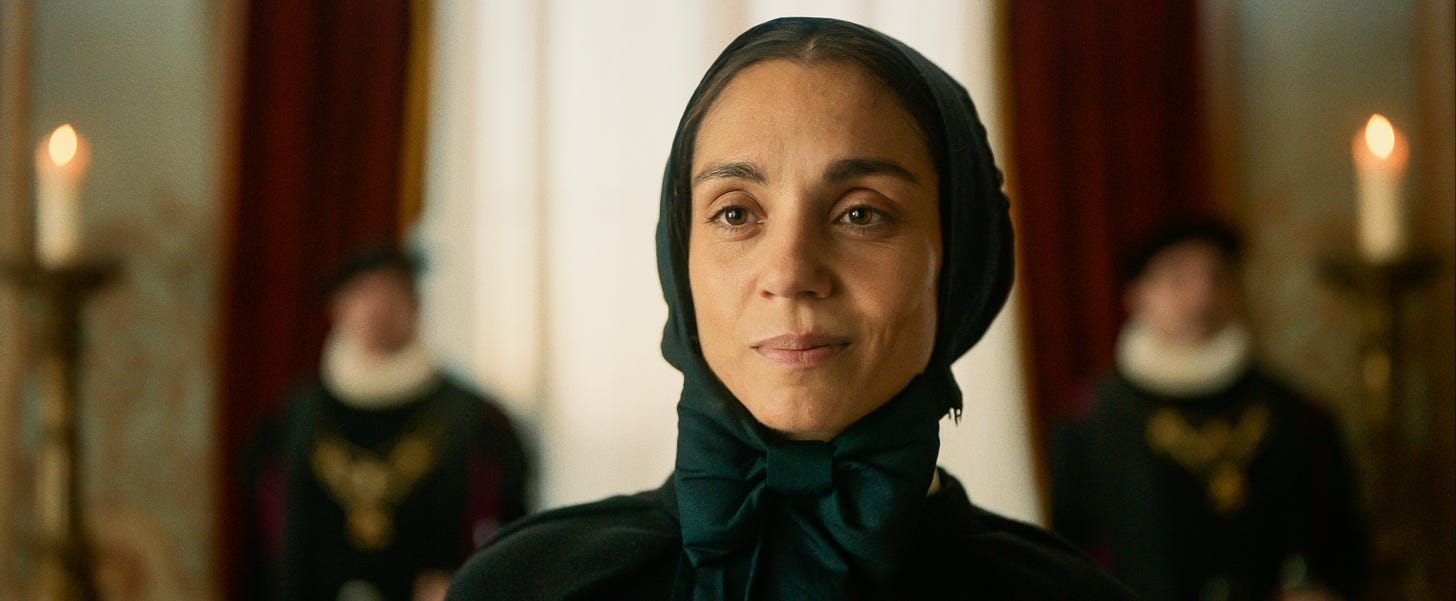I saw Cabrini on Saturday with a group that included my mom, my oldest niece, and Robynn, my friend of thirty-five years, and I figured I’d just go see it and not write anything about it. Bloggers and writers, especially those of us who write reviews, know very well that feeling of “If I don’t write about it, it didn’t happen,” an idea that slightly unnerves me because it feels like a harbinger of burnout.
However, it’s almost impossible not to have an opinion about Cabrini. This wonderful movie, which was directed by Alejandro Monteverde and released by Angel Studios, both of Sound of Freedom fame, goes right for the jugular. Cabrini, who is known as the first American saint, was a troublemaker in the best way.
For those who might not be familiar with Cabrini’s story, and until last Saturday I included myself in that number, Maria Francesca Cabrini was born on July 15, 1850 in Sant’Angelo Lodigiano, Italy, and despite lifelong physical frailty, was extremely driven, founding, along with seven other women, the Missionary Sisters of the Sacred Heart of Jesus in 1880.
While heading an orphanage in Codogna, Cabrini tried over and over to become a missionary in China, but was continually refused because of her poor health. She was so hot to trot on the idea of going to China, though, that she went to Rome and talked to the Pope, who, much to her surprise, told her, “Go West, not East.”
Cabrini and her sisters arrived in New York City expecting to work with the poor in the slums of Five Points. Don’t bother, they were told. It’s hopeless. It’s too dangerous. Cabrini, however, doesn’t take no for an answer, especially once she sees the way Italian immigrants are treated like scum. She founds an orphanage although she’s told by the local bishop that she’s not allowed to solicit funds, but Cabrini finds a way around that. I won’t ruin anything, not that it’s hard to look up what happened, but suffice it to say, Cabrini’s ministry doesn’t end with the orphanage or Five Points.
One of the best words to describe Cabrini, at least to start with, is solid. Solid message, solid structure, solid presentation, and solid acting from each of the performers. The film doesn’t try to pretty up the hardships the characters endured, or clean up Five Points, which, admittedly, looked worse in real life than what is seen in the film, and it makes what ends up happening that much brighter and more compelling.
Cristiana Dell’Anna as Cabrini puts in a very gutsy performance. She could have easily let Cabrini simply be a tower of strength, but she shows the woman’s frailty and compassion. When the people Cabrini tries to help are hurt by their circumstances, she grieves for them. She makes every effort to see beyond first impressions and look for strengths, but she’s not blind to weaknesses and sin, either. This must have been a taxing role for Dell’Anna, as Cabrini is in almost every scene and she can’t let up for a second. It’s Oscar-worthy, it really is.
Since Cabrini is a biopic, there were a few liberties taken, such as Connelly, the reporter that Cabrini makes friends with, was actually a composite, but unlike some biopics we can mention, the changes stay within the historical record and only serve to streamline the story. While it’s a long one at two hours and twenty-five minutes, the time flies by, giving ample breathing room to a brilliantly executed movie. Audiences who see it will no doubt feel challenged to look at their fellow man in a different way than they did before.
Cabrini is currently in theaters. Rated PG-13.
My grade: A+
Principal Cast: Cristiana Dell’Anna, John Lithgow, David Morse, Giancarlo Giannini, Federico Castelluccio, Katherine Boecher, Jeremy Bobb, Romana Maggiora Vergano, Patch Darragh, Victoria Martzloff, Sean Cullen, Montserrat Espadale, Virginia Bocelli, Frederico Ielapi, Madison Hammer, Lukas Behnken, Liam Campora, Tom Bauerle
Directed by Alejandro Monteverde.
Written by Alejandro Monteverde and Rod Barr.




